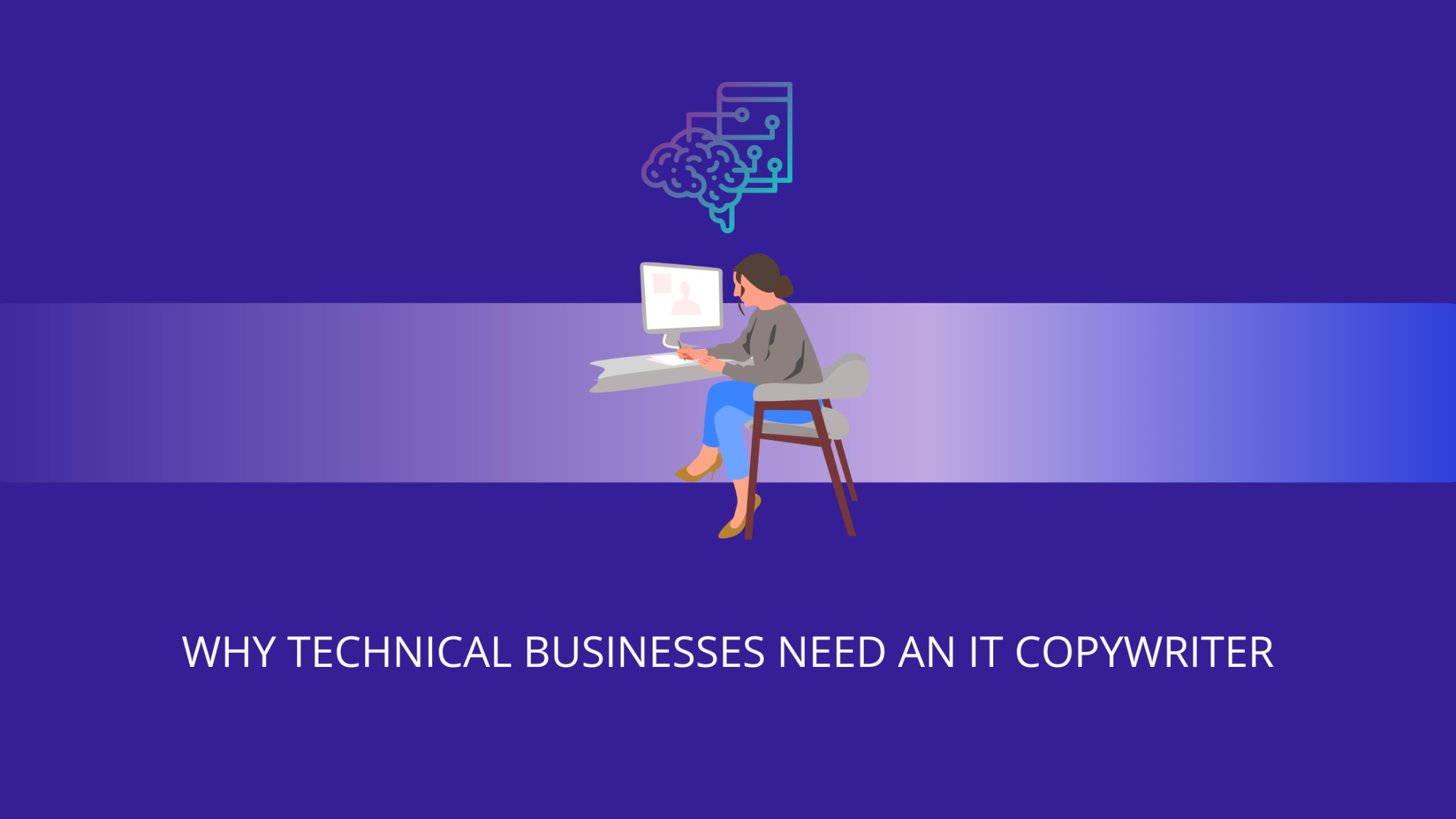While at a business exhibition, a business owner once remarked to me that that from reading some of the exhibitors’ display banners, it looked like their businesses did the same thing. It was only by talking to the representatives that they realised their first impression wasn’t true at all. Looking around the room, I could see what they meant. This was a person with a technical background. And what they really meant was the generic statements plastered everywhere.
That got me thinking. Imagine what navigating the internet is like if you don’t even have a technical background. How many people call the wrong business looking for the wrong thing? And imagine the time saved for all by clients being able to quickly identify the right service.
Technical businesses need copywriters more than anyone
Copywriting in the technical space is about balancing the service offered with a multitude of other components. Making it clear what problems you solve, while giving an understanding of what the client can expect from you. This should be wrapped up in the right tone of voice for your market and giving some brand personality (because in the interaction you want your reader to feel something).
But some businesses still do not do this.
That’s why getting a copywriter on board for any business communications is a good idea. Not only does it allow you to focus on the running of your company, but it means you are in the hands of a professional who will connect you to your target audience. It’s going to be a much more efficient and successful outcome that way.
So if you’re a business of a technical nature, a technical or IT copywriter could be the essential component to bridging the gap between what you offer and how the client understands your service. How? Read on.
Clients don’t always know what they need: An IT copywriter can help
An IT copywriter can help a prospective client to see their problems reflected in your service pages, and easily understand how you can help. They’ll bridge the barrier between ‘normal’ folk and the technical teams delivering the service. In this process, a copywriter can often focus on building a relationship by reducing guilt on the part of the consumer, and raising relatability instead. These problems are normal, and human, and not everyone can be expected to understand the dense stuff.
A common pain point for all companies, let alone those of a tech nature, is that clients don’t always understand what they want. Or even what they are asking for. Let alone how much value to put on it. And even if they do, often they can’t tell if it’s you they need to solve their problem.
Of course we live in a time where we have educated markets. However an IT copywriter will be able to write material for multiple niches, ensuring it’s easy on any market level, balancing the offer with a message that will make an impression.
A copywriter will challenge your internal language
There are accepted industry terms that customers will expect to see on your website. But when clients are confused by what you do, it’s usually the result of ‘in-speak’. Websites are often written from the perspective of an internal team, even when they have a copywriter at their disposal. And whilst you may have gifted in-house writers who understand what you have to offer very well, it could be that the copy just isn’t written from a user-perspective.
If that’s the case, it’s common that the needs of your target client are being neglected. Their problems must be represented, their questions answered, and an appropriate amount of education to the audience should be given.
How clients become confused
Let’s take IT support. Broadly speaking, there are two types of IT support – hardware and software. In the same vein, there are also two different types of markets – business to business, or business to customer.
The business to customer market is going to require less industry terms and more everyday language for the average user. This will allow them to identify very quickly if you can help them before contacting you. If you are going for a domestic market, do they even know the difference between hardware and software?
Keep it simple

There’s a case for taking a simple approach regardless of what business you’re in. Even on a B2B level, it can often be that your ideal client will not be as technical as you. If they are outsourcing support, it’s likely they don’t have the in-house specialism that they require. And apart from that, imagine the amount of these businesses where it’s the business owners themselves doing the primary research, which will definitely be the case with independent companies, and smaller businesses. Imagine also those asking their PA or HR personnel to research support services.
An IT copywriter will help you explore who your market is and prioritise the appropriate problems that you solve with the right storytelling and language. They can communicate meaning simply, without being boring or abstract, allowing your audience to quickly and simply understand what they need to know.
Creating an approachable brand

Part of the job of your copy is to give a sense of who you are and what you are like to interact with. The tone of your business copy is a way of establishing the relationship you are going to have with your client, and this is different for everyone and depends on how formal your style of service is.
However, a big concern of those in technical services are being approachable and easy to understand. Communicating a sense of personality, or a friendly voice could be a good approach when dealing with dense subjects. That’s because technology can be an intimidating area for clients if your ideal customers are those who have no knowledge of your service.
This plays out in businesses like website hosting firms where small business owners with no IT teams have to deal directly with the solution provider themselves. So in these cases, it’s essential to demystify the apparent black magic of technology, and language is a big part of that.
Creating copy that doesn’t intimidate your market while still doing the work of communicating your expertise and value is something the best copywriters find easy. Taking this approach will help you to reach markets inhabited by non-technical folk.
An IT copywriter will prepare your audience
Sometimes clients need to understand a few things before they contact you. A copywriter will help you to solve any existing problems you’re experiencing with some thoughtful messaging. This could help you in a few ways.
Education
For less aware markets, an IT copywriter will be able to help your clients understand how your solution solves their problems. That’s an education in itself. More than that, though, they may discuss with you ideas for specific content (blogs, or social media posts etc) that help answer your client’s questions in or around your jurisdiction. These could help build your authority in your field. Not just as service providers, but as experts.
What to expect from your service
Clients need their expectations set up appropriately. Maybe you are a bespoke service, or you have a tiered service depending on the subscription they sign up for. Will they deal with humans, or do they access your service via an online account? These are things your IT copywriter will consider and help build your audience’s expectations so they understand the terms on which you deliver your solution and play up the benefits of your service in the best way.
Content for the researcher – capturing your market at the ‘pre-buy’ stage
Copywriting is about selling, content writing is about building trust. A writer niched in IT and technology can help you attract audiences at different stages of the buying process. A good writer will see opportunities for you to capture those in the research stage and bring them to your website. With the right search terms, and some excellent pieces that help them answer the questions they have just before they buy a product like yours could mean you’ll win a fan that will get them to the checkout later.
Understanding the depth of work
Clients don’t always understand the tricky work of technical services. Sometimes clients don’t appreciate the work that goes on behind the scenes. Project managers and customer support can shield them from the pain of dealing directly with a developer. What that does is they can underestimate the work that goes into a specific service. While you want your solution to be ‘easy’ for the client, you want to be value with them, and a copywriter can easily help you do this in how they write about your services, striking just the right balance of offering a solution that is easy for them to access, facilitated by your hardwork and expertise in the field.
A copywriter’s skills help you to build a sense of value
Clients don’t always understand why something costs what it does. And if we’re being fair, why should they? It’s the job of the business who are selling the solution to build that sense of value.
But it’s not easy. A copywriter is a wordsmith and a salesperson. They bring a fresh perspective to your value and are adept at communicating the benefits of a service in a way that you might not have previously considered.
If you find your clients are often surprised, then it’s a good time to look at where your website copy can be improved. If it’s hard to get a sense of perspective, get third party feedback via a user testing service. And don’t forget to check what your competitors are doing. Don’t copy them, but it will be an education on where you can build a better sense of value.
Working with a professional adds credibility

I am going to take you to a more general point now, outside of the realms of technology. There is an art to creating copy and content that both sells and creates relationships with your target markets. But there’s a good ‘housekeeping’ reason to work with a professional writer. It reduces the chances of mistakes being made in your business copy.
That may seem like a minor point, but actually it’s as important as any on this list. Because numerous studies over the years show that poor grammar reduces credibility, and these mistakes cost businesses money.
No service is infallible and mistakes do happen. But to consistently jar your reader is dangerous territory. Research from 2013 showed that 74% of readers pay attention to poor grammar, spelling and punctuation. Furthermore, 59% of them would avoid buying from a company with obvious spelling or grammar mistakes.
But that was nine years ago, surely we have moved on from this? Perhaps, but not much. More recent data shows that 42.5% of readers judge these mistakes negatively.
LinkedIn have also conducted a sample survey showing a strong correlation between good writing and promotion into directorships. Taking 100 profiles, they found that those who had failed to make a directorship position in their first ten years of career were 2.5 times more likely to have grammar and spelling errors in their profiles. Candidates with fewer mistakes were more likely to be promoted multiple times in the same ten year period.
What does that have to do with copywriting?
This data is proof of the work culture in which we operate. Those decision-makers who are promoting their directors are also making decisions about what businesses they partner with. This is a highly educated audience with exceptional standards, and targets to meet. They want to work with impeccable suppliers.
That’s a consideration that can’t be overlooked.

